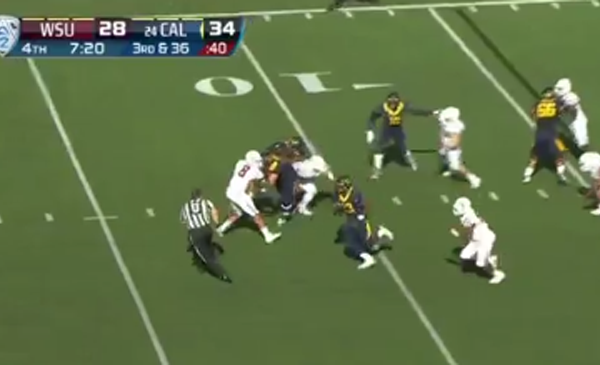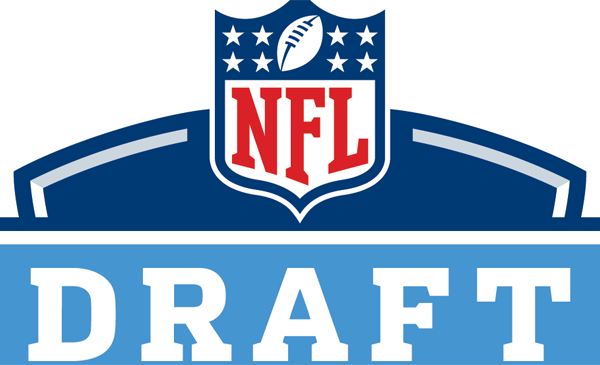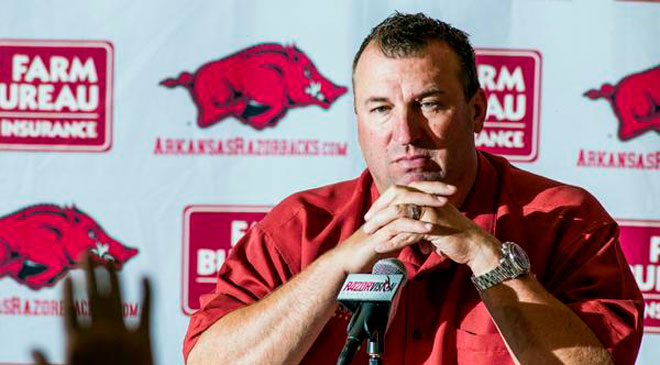Bret Bielema. Oh, Bret Bielema. Why, after the superb job you and your Arkansas staff did in 2014, did you feel it necessary to again turn an issue of player safety into a platform for politicking?
Bielema told Matt Hayes of Sporting News, “We have an obligation to do what’s right. I can’t understand how some guys can’t see that.”
Doing “what’s right” means limiting the pace of play, ergo slowing down the uptempo offenses that have become prevalent around college football.
Bret Bielema employs a more traditional style, and he’s done quite well with it. His three straight Rose Bowl appearances at Wisconsin speak to his coaching acumen; so, too, is Arkansas’ quick turnaround from absolute dumpster fire to a bowl-game victory, winning record and possible contention for the SEC West in 2015.
This latest exercise in politicking comes the same day Sports Illustrated‘s Colin Becht wrote a feature on Bielema silencing critics with his success at Arkansas.
The Razorbacks are breakthrough contenders in 2015, relying on a stout offensive line and corps of studly ball-carriers; the hallmarks of any successful Bielema-coached team.
Frankly, Bret Bielema is too good to spend every offseason behaving like a congressman on Meet The Press, trying to distort his political opposition’s message so badly that it’s not just a matter of disagreement: He must paint his opponents as being outright evil.
Read the piece, as Hayes advises, with an open mind. After all, there are some interesting nuggets, such as:
I just read a study that said players in the no-huddle, hurry-up offense play the equivalent of five more games than those that don’t. That’s an incredible number. Our awareness as a whole has to increase.
But having an open mind isn’t the same as accepting Bielema’s rhetoric at face value. An open mind means considering all angles — angles such as:
FWIW The slowest pace of play in football is the NFL, yet its season ending injury rate is nearly 3x that of P5 football cc: BB
— Dave Bartoo (@CFBMatrix) March 18, 2015
Also consider the angle from which hurry-up coaches come from. When Bielema launched his first political offensive against uptempo offenses in 2013, I asked several Pac-12 coaches their thoughts.
Arizona State’s Todd Graham:
“There’s no safety issue. It’s just hard to defend.”
USC’s Steve Sarkisian, who was introducing a hurry-up scheme at Washington in 2013:
“They have 85 guys on scholarship. Play them.”
For the record, Sarkisian’s position didn’t change in his first season at USC, when the Trojans played with fewer than 50 scholarship players most weeks. In fact, by the end of the regular season, the Trojans were operating at their fastest pace of the campaign.
Now, SEC coach Bret Bielema’s opinion might not be germane to the goings-on of the Pac-12 — had Bielema’s rhetoric not taking one of the West’s own to task.
Bielema made headlines and elicited outrage — rightfully — when, in February 2014, he alluded to the death of Cal defensive lineman Ted Agu as the byproduct of hurry-up offenses. In the above mentioned SI piece, Bielema says his rhetoric was taken out-of-context. Not-so-coincidentally, that’s the catch-all excuse politicians employ when called out on saying something ridiculous.
So what’s the context invoking Chris Borland’s retirement? Borland didn’t play in a hurry-up system at Wisconsin, nor would he have, in the Big Ten, faced as many uptempo opponents as players in the Big 12 or Pac-12. He certainly wasn’t playing uptempo opponents regularly in the NFL.
Until Bret Bielema can often this conspicuously missing context, all he’s offering is a lot of empty rhetoric.








[…] Bret Bielema isn’t afraid to share his opinions, no matter how factually flawed his stance might be. The Arkansas head coach’s latest target, […]